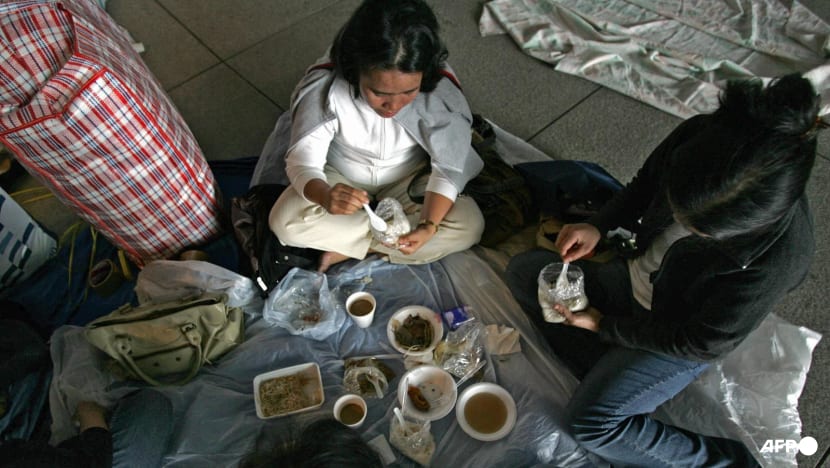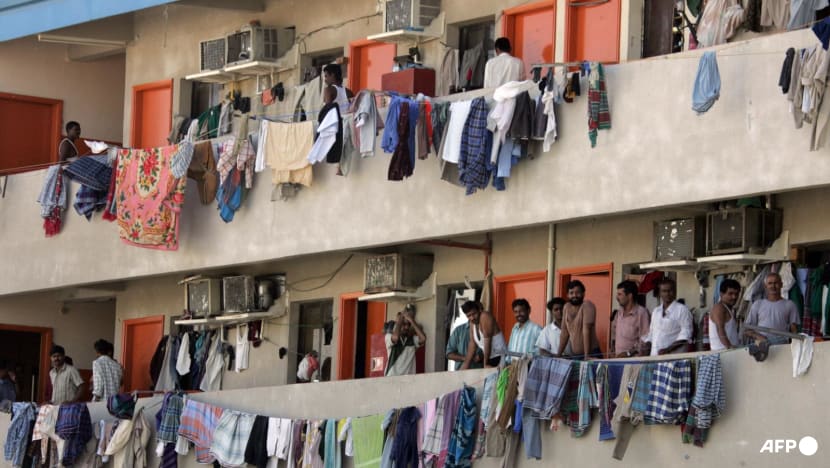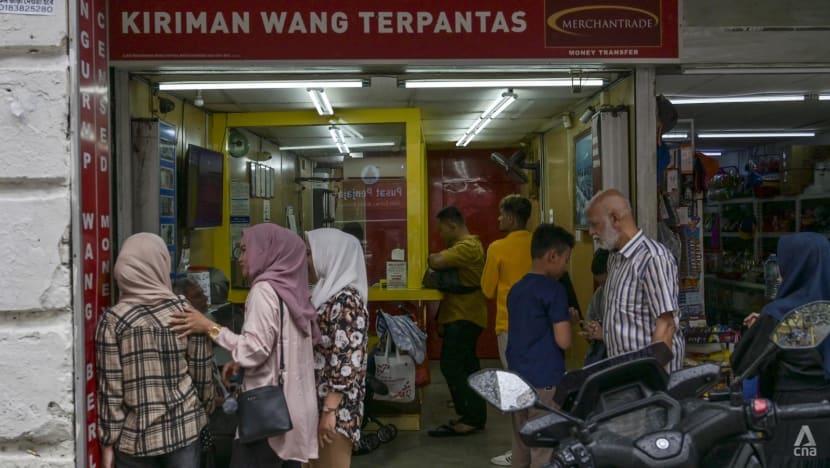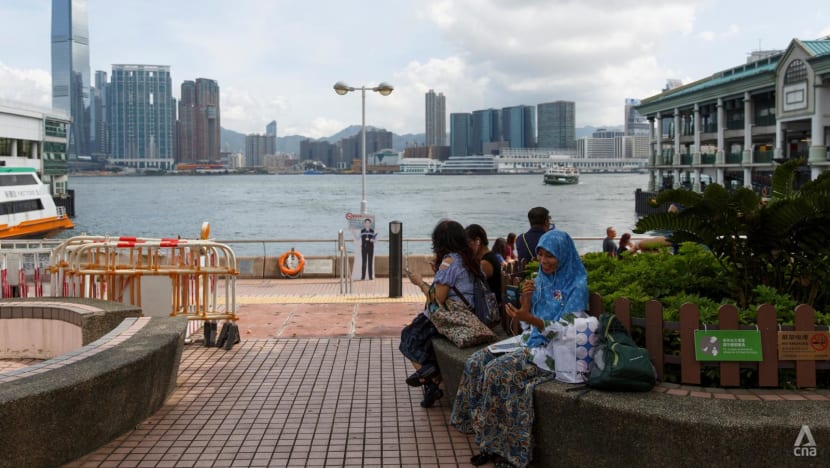JAKARTA/KUALA LUMPUR: Every night, a loud husky voice pierces through the hustle and bustle of Malaysia’s downtown Penang.
As throngs of tourists pass by her restaurant, Rosa Angelina calls out to them in Malay, English and Mandarin, inviting them to savour the establishment’s famous stir-fried noodles.
The 32-year-old Indonesian, who has been waiting tables in Malaysia for nine years, makes around RM2,000 (US$443) per month, which is around three-and-a-half times the pay waitresses make in her hometown in North Sumatra province.
Because of her language skills, her pay is also higher than that of her peers in Malaysia, who are paid the monthly minimum wage of RM1,500.
But despite this, money woes are taking a toll on Rosa’s life.
Half of her salary goes to supporting her parents, leaving her just enough to buy food, pay for public transportation and share an 18sqm room with another Indonesian woman at a property on the other side of the island, about an hour’s bus ride from where she works.
“I used to be able to rent a place somewhere close to the city centre. Nowadays, I can only afford places that are far away,” she said.
“The bus ride can be tiring, especially after a busy day like on weekends or during the holiday seasons. But it’s fine. You just have to remember that you’re doing this for your family.”
Meanwhile, in a suburb in Kuala Lumpur, a migrant worker from Myanmar who only wanted to be known as Kyaw cleans tables and sweeps the floor of a Chinese mixed-rice restaurant as customers come and go from lunch to dinner.
Despite being undocumented, the general worker is able to earn about RM2,000 a month. He gets only one off day a month.
While he gets free food at his employer’s shop, he still needs about RM1,000 a month for other expenses, including rental in a small shop lot with his fellow migrants close to where he works.
He sends RM1,000 home to his family most months although there have been times where he could only send home a few hundred ringgit because there were extra “expenses” such as bribes he had to give to the authorities due to his undocumented status.
Kyaw told CNA that he had come to Malaysia legally back in 2017 from Yangon to work but is now considered undocumented because he has overstayed his work permit. If discovered by the authorities, he could be imprisoned and deported.
Because of the political and economic situation back home, Kyaw feels he has no choice but to stay put in Malaysia for the next few years at least.
“I am doing this only for my family. They don’t really know the difficulties I am going through but I don’t have much of a choice. There isn’t any work back home,” he said, with tears in his eyes.
Across the region, millions of people from countries such as Indonesia, the Philippines and Myanmar seek employment abroad in search of a better life for themselves and their families.
Overseas, these migrant workers can earn three to five times more than doing the same job at home.
But living alone in a foreign land, away from the support of families and friends, can be daunting.

Food and rent are many times more expensive than what they cost in their respective hometowns and villages. Since many workers send the bulk of their salaries to support their families back home, what remains is barely enough to cover their own needs.
Even those without families to support can sometimes struggle to get by because they need to repay the debt they have accumulated to pay for tickets, training courses or administrative government fees before they receive their first paycheck.
Then there are those who spend their money unwisely because of low financial literacy as well as peer and family pressure, social expectations set by social media, and temptations to emulate the exorbitant lifestyles of the affluent locals they see every day.
RISING COST OF LIVING
While migrant workers’ wages have increased in the last decade in host countries across the Middle East, East Asia and Southeast Asia, these salaries sometimes fail to keep up with soaring prices.
In Hong Kong, the minimum wage went from HK$30 (US$3.86) per hour in 2013 to HK$40 an hour this year, an increase of 33.3 per cent. But property prices have also gone up by 33 per cent during the same period while food prices rose by between 2.5 and 3 per cent every year.
In the United Arab Emirates, which is a key destination for migrant workers from Southeast Asia, unskilled labourers are today paid at least 1,500 dirham (US$408) per month, a 36 per cent rise from the minimum of 1,100 dirham monthly salaries they received in 2013.
But food prices have increased by between 3 and 7 per cent annually while rent in the Gulf state has gone up by between 5 and 10 per cent annually over the last 11 years.

Meanwhile, the monthly minimum wage in Peninsular Malaysia has gone from RM900 when the country first introduced the Minimum Wage Order in 2013 to RM1,500 today. The Malaysian government has agreed to raise the minimum wage to RM1,700 a month, which will take effect in February of next year.
However, house rent has almost doubled compared to what it was a decade ago while on average, food prices have risen by around 3 per cent annually.
And migrant workers are feeling the pinch.
When Indonesian waiter Rosa first arrived in Penang nine years ago, she was paid around RM1,100 per month, slightly above the minimum wage, because of her experience working in a similar restaurant back in Indonesia.
While her salary had almost doubled since then, so too has the cost of living on the tourist island as well as back in her hometown.
“I had to spend more money on rent and I had to send more and more money home because in Indonesia, electricity bills, cooking oil, rice, everything is expensive now. So even with my raise I’m still struggling to get by,” she said.
Construction site foreman Kurnia Adi, who is from Madura, Indonesia, told CNA that salaries in the sector have generally gone down as there is less overtime work compared to before. Many migrant workers depend on overtime work to bulk up their wages.
“But many Indonesians still don’t have a choice because there is no work back home,” he said, adding that migrants earned three times the salary of what was offered in Indonesia.

Kurnia, who has been in Malaysia for about 30 years and has a professional work visa, said that the amount of earnings sent back home was becoming less as the higher cost of living affected all migrant workers.
“It’s becoming tougher and tougher. Many have to look for additional jobs outside work to supplement their incomes,” he said, adding that he was hoping to open up a business in Indonesia one day where he could provide jobs for his countrymen.
The rising costs of living can be especially hard for undocumented workers who are often powerless when employers pay them far below the minimum wage or withheld their salaries for months on end.
“I once ate nothing but instant noodles because I had no money. Some days, I didn’t eat anything at all,” said Ari Yulianto, a 40-year-old Indonesian who worked odd jobs in Malaysia from 2002 to 2020.
Ari, who had a total of seven employers over his years working in Malaysia, said one employer paid him only RM25 a day for doing construction work instead of the promised RM100 and that another owed him three months’ salary for picking oil palm fruit.
Because reporting unfair treatment to the authorities would mean exposing their status as undocumented workers, these migrant workers are also more prone to abuse and harsh working conditions compared to those with permission to work legally in the country.

A LIFESTYLE THEY CANNOT AFFORD
Ari said he tried to hide his hardship from his wife and children back home.
He made sure he never posted pictures on social media of his dilapidated dormitory which he shared with five other workers or complained about the long and physically exhausting day at work whenever his family made a video call.
“Instead, I posted pictures of my day at the beach or my visit to the many landmarks around my city. I don’t want my children to worry about me,” the father of two said.
Ari is not alone.
Marvin Rimas of the Metro Manila-based advocacy group Migrante Philippines said families back home are often in the dark about the plights migrant workers face abroad.
“They don’t know that the migrant workers have to work long hours and are struggling to get by. All they know is that these migrant workers are sending money home which for the less fortunate can be huge,” Rimas told CNA.
There are as many as 169 million migrant workers across the globe, according to the International Labour Organization. In 2022, these workers sent home US$794 billion, the World Bank estimated.
Rimas said with the many sacrifices these migrant workers make, they expect their families to spend the remitted money wisely like opening up a business or saving up so that their children can go to college.
Instead, Rimas has seen families spending the money on lavish holidays, buying cars or other expensive items.
“When these migrant workers come back, they are shocked that there is no money left in the bank. So they had no choice but to become migrant workers again,” the Migrante Philippines secretary general said.

Some migrant workers from Indonesia also have to deal with family members wasting their hard-earned money which often leads to frictions, fights and sometimes divorce.
“We have cases where the husband received huge sums of money from their wives who are working abroad. And instead of using the money to build a better future together, the husband had another wife,” Anies Hidayah, a commissioner at the Indonesian Human Rights Commission and a long-time migrant worker’s rights advocate, told CNA.
And it is not just family members back home who fail to be mindful of how money is spent.
“There is a lot of pressure from your fellow workers. They would say: ‘Let’s go out and have drinks’ or ‘let’s go shopping’,” said Cathy, a 26-year-old Filipino who has been working as a domestic worker in Hong Kong for six years.
This was why she began buying stuff she could not afford: Smartphones, handbags, jewellery and dresses.
“I wanted to look like the tourists and expats I saw every time my friends and I went out,” Cathy, who asked CNA not to reveal her full name, said.
The pressure to appear successful on social media also served as an impetus to buy things she did not need.
The shopping addiction worsened after the COVID-19 pandemic hit, as e-commerce platforms began introducing a new feature: Buy now, pay later.
She was treating the new feature as if it was free money, sometimes spending more than what she earned in a month.
Then came the realisation that she had to pay back what she had purchased and there was no money in the bank.
“All my salary went to pay off my debts. I had to borrow money from friends and families just to feed myself,” Cathy said, adding that it took her three years to pay back all the money she had borrowed.
According to a 2019 study by the International Organization for Migration (IOM), out of 1,698 migrant workers from Southeast Asian countries surveyed, 31 per cent said they had no change in their savings upon returning from overseas while 21 per cent saw their savings decrease after their migration.
About 17 per cent of migrant workers from Southeast Asia told IOM that they came home in debt after they returned home from overseas.

DEBT TRAP
Many workers incur debts by taking up huge loans even before they set foot on foreign soil.
Because of the limited number of migrant workers host countries accept each year, many are willing to pay brokers and intermediaries thousands of dollars for a chance to work abroad.
These expenses can be legitimate, like airfares, training courses and government administrative fees, but they can also be illicit in nature such as bribes.
A 40-year-old Indonesian mother of two who wished to be identified only as Nur said she had to cough up around 30 million rupiah (US$1,844) before she became a caregiver in Taiwan in May.
Around 20 million rupiah was spent on her two-month training and lodging at a migrant worker training facility in Indonesia’s Central Java province, acquiring the necessary documents needed to work in Taiwan as well as her tickets to Taipei.
The rest went to a broker who claimed he could help ensure that Nur was chosen against the hundreds of other applicants vying to work in Taiwan.
“I was told by this guy that I was actually underqualified and that my application would be rejected. But he said he knows people at the training centre. So I paid him 10 million rupiah just to guarantee a spot at the training centre,” she told CNA.
Months after her March 2024 encounter, Nur is still unsure if the man truly pulled the strings or if she was selected based on her skills and experience.
What matters is that Nur has to pay back the money she borrowed from a loan shark and a peer-to-peer lending platform, both of which charge substantially more than the 10 to 25 per cent annual interest rate of conventional banks.
With her NT$20,000 (US$615) monthly salary, some of which is spent on her day-to-day needs in Taiwan, she is struggling to pay off her debts. She has yet to send money home.
According to 2021 findings by the World Bank, 97.7 million adult Indonesians were under-banked, which means that they had little to no access to banks or similar financial institutions. This makes them vulnerable to loan sharks or other predatory lending practices.

Workers from the Philippines have also fallen into a similar debt trap with applicants taking out huge loans to pay recruitment fees and airfares.
Like their Indonesian peers, many have fallen prey to brokers and intermediaries who inflate the official costs of these fees, as well as loan sharks who sometimes charge an annual interest rate of more than 100 per cent.
The country’s under-banked population was 34.3 million, according to the 2021 World Bank study.
“I have seen many families who are in worse conditions compared to when they first became a migrant worker,” said Elisa Gumarang, a city councillor in San Isidro, a district on the outskirts of Metro Manila where many of the local population have left to work overseas.
The councillor said migrant workers sometimes found themselves abused, had their salaries withheld or got fired, long before their contracts were supposed to end. Many had to be repatriated before they could make any real money or were able to pay off their debts.

FINANCIAL LITERACY MATTERS
Indonesia’s newly-appointed minister for migrant workers’ protection, Abdul Kadir Karding, said on Oct 28 that he would cut down the amount of levies and expenses imposed on migrant workers arguing that these fees can be “excessive” and “exploitative”.
Meanwhile, the Philippines is mulling establishing a pension fund for overseas workers to protect workers and their families against the risks of old age, disability, sickness, death and unemployment.
But governments also need to teach their citizens financial literacy, the ability to manage income and expenditures and make informed decisions regarding money, say some organisations dedicated to migrant workers.
“They need to be able to determine how much of their salaries should go to their families, how much should go to cover their day-to-day needs abroad and how much should go into their savings account,” said Rimas of Migrante Philippines.
“Unfortunately, we don’t have that kind of training programme here in the Philippines.”
Nasrikah Paidin, an adviser to the Indonesian Migrant Domestic Workers Association in Malaysia, said that financial literacy for migrant workers is of utmost importance.
She has seen how some migrants send almost everything they earn to their families, with no accountability on how they spend the hard-earned money.
“In our training, we tell the migrants that while they can give money to their family, they must also learn to say no,” she said.
“They are sacrificing for their families but it shouldn’t be like that forever. Their goal should be to at least build a house and open up a business back home once their contract is over.”
Melinda Damayanti, 29, who is from the Indonesian city of Bandung, has been working as a factory operator at a multinational company in Shah Alam, where she is in charge of assembling turntables.
Melinda, who has been working in Malaysia for eight years, feels lucky that she is provided a hostel by her employers and transportation to and from the factory every day.
She earns about RM2,800 monthly with overtime, with about RM1,000 used for her personal expenses including food. She sometimes earns bonuses and her company even provides all workers with insurance.

She hopes to be back in Indonesia in a year or two, and for the past few years has been wary of sending all her earnings back home, keeping a portion of her salary for herself in her own bank account.
“Whenever I asked my family about money, they said it had all been spent. There was nothing left for me. I felt disappointed that I personally have nothing to show for myself despite being away for a long time,” she said, adding that the decision to go to Malaysia was her own.
Melinda said that she harbours dreams of becoming a homemaker one day and would like to start a life of her own back home. That, she said, would require savings of her own.
“I can only cry sometimes to myself and wonder until when I will be here,” she said.
Knowing how to manage one’s money as well as having clear goals in mind and working hard to achieve them are key for migrant workers to be able to escape poverty, said Filipino businesswoman Rebecca Bustamante, who used to be a domestic worker in Singapore and a nanny in Canada in the 1980s and 1990s.
Like many Filipinos seeking work abroad, Bustamante, who has 10 brothers and sisters, grew up in an impoverished neighbourhood in a small coastal town about 280km northwest of Manila.
She became a domestic helper in 1986 because her family was in debt and their house was on the verge of being repossessed by the banks.
“I worked in Singapore so I can pay my family’s debt and help my siblings,” she said. “But I had a goal and that is to not become a domestic helper for the rest of my life.”
After a chance encounter with a lecturer at an open university in Singapore, she studied accounting outside her long days of being a helper.
“I was already working close to 18 hours a day but I was determined to complete my course,” Bustamante said, adding that she returned to the Philippines in 1990 with a certificate in accounting.

She then set her sights on Canada, which offered an open work permit programme. Her gateway to obtaining such a permit was to become a nanny for two years.
Armed with the accounting certificate she obtained in Singapore, she then worked as a sales representative for various companies, selling anything from kitchenware to insurance.
After years in Canada and securing permanent residency, she started her own business in 2005, helping Filipinos find white-collar work in the North American country.
“Many migrant workers think that they are destined to be nothing more than domestic helpers or blue-collar workers.
“But if you really want to give yourself a better future, you need to develop yourself, upgrade your skills and set goals,” Bustamante, who is often invited to give motivational speeches to migrant workers and aspiring entrepreneurs, said.
“I often get asked ‘what’s the secret to your success?’ But there really is no secret. It’s all about setting your mind to achieving a certain goal and putting in the time and effort to achieve it.”
